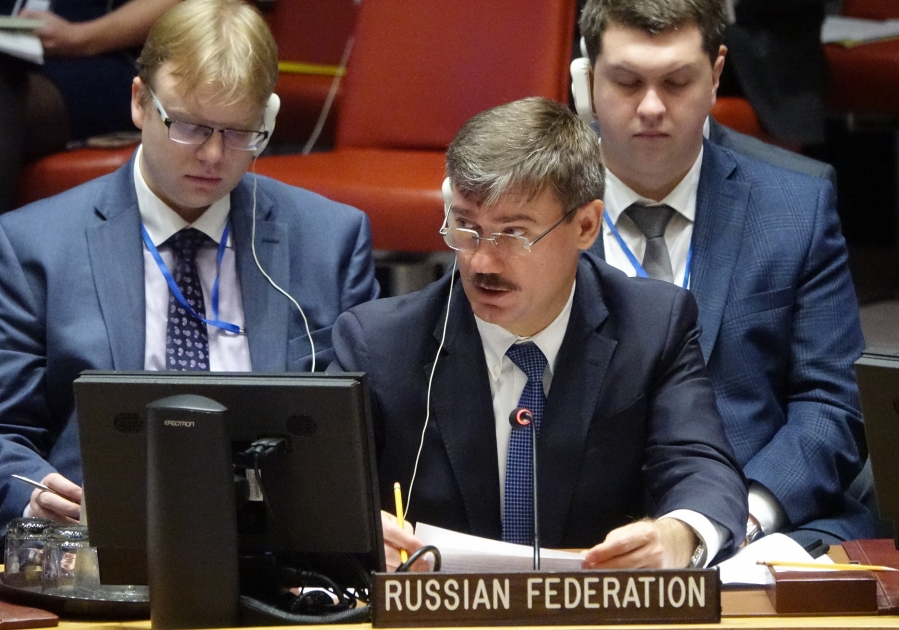Statement by Mr.Petr Illiichev, First Deputy Permanent Representative of the Russian Federation to the United Nations, at the Security Council on the situation in the Central African Republic
We thank Special Representative of the Secretary-General Parfait Onanga-Anyanga, as well as the Special Representative of the African Union, Mr. Moussa Nebie, and the representative of the Community of Sant’Egidio, Mr. Mauro Garofalo, for their detailed briefings.
We share the concerns about the continuing situation of military and political tension in the country and the fact that clashes between groups are increasingly ethnic and confessional in nature. Of course, civilians are the ones who suffer the most. The top priority of all parties to the conflict should be to provide humanitarian access to the victims. The authorities must create the conditions for a safe and voluntary return of refugees and internally displaced persons to their homes.
The already difficult situation is further complicated by the fact that the authorities actually control only the capital, Bangui, and the local Government bodies are paralysed or lacking in the rest of the country. The adoption of the national strategy for the restoration of State authority on 8 September and the appointment of prefects and subprefects are certainly steps in the right direction, but much remains to be done to do.
With the signing in Rome, on 19 June, of a peaceful political agreement between the Government and armed groups, real prospects for normalizing the situation in the Central African Republic have opened up. We support the steps outlined in that document towards stabilization and establishing a ceasefire throughout the country, lifting restrictions on the free movement of goods and people, releasing illegally detained persons and ensuring that illegal armed groups recognzie authorities elected in the 2015-2016 elections as legitimate. We believe it is necessary for all parties to the agreement to undertake additional efforts to quickly implement its provisions.
We support the steps being taken by Bangui to reform the security sector and resume control over the entire territory of the country. Those steps are aimed at contributing, including with the support of the international community, to resolving the issues and tasks, many of which were justly mentioned in the recent report of the Secretary-General (S/2017/865), and they contribute to implementing the national defence plan approved by President Touadera on 4 September, which includes the gradual transfer of responsibility for State affairs in the country to the legitimate authorities.
We note the efforts by the Government of the Central African Republic aimed at ensuring operational and combat readiness and rapidly deploying two battalions of its armed forces, which, as we understand it, should form the backbone of the future unified armed forces of the country. The Central African authorities will need to work together to ensure that the justice system starts working properly, with a focus on building national capacities.
Temporary emergency measures by peacekeepers and the delayed establishment of the Special Criminal Court are not a panacea for the country’s problems in combating impunity. International experience has shown that various courts with international support are not very effective and are costly.
It is also important to create favourable conditions for the implementation of the African Initiative for Peace and Reconciliation in the Central African Republic. Also, the road map for a Central African settlement adopted in the Libreville on 17 July must be fully implemented. In that connection, we stress the importance of coordinating and harmonizing all the peace initiatives related to the Central African Republic.
The Blue Helmets are playing an important stabilizing role in the Central African Republic. We are ready to carefully study the proposal of the Secretary-General on increasing the military component of the United Nations Multidimensional Integrated Stabilization Mission in the Central African Republic (MINUSCA), given the difficult situation in the country. At the same time, we want to stress once again that we must be careful in cooperating with troop-contributing countries. It is unacceptable for an entire contingent to be removed due to sexual abuses committed by a few individual peacekeepers and to have no substitute for the unit for an extended period of time, which seriously undermines the operational potential of the mission.
It is essential to take coherent steps to address the challenges facing the Central African community and to allocate funds from international partners and donors, including the resources pledged at the Brussels Conference for the Central African Republic in November 2016. In that context, we encourage Bangui to create a transparent and effective national system in order to manage international aid.
Russia, as a participant in the international support group on the Central African Republic, intends to continue actively promoting the peace process in the Central African Republic, where Russian air transport resources have already made a significant contribution to MINUSCA operations.
